Last Updated on June 12, 2023 by Laura Thompson
People think it strange that rabbit owners are so obsessed with their pet’s poop but they don’t understand that animal fecal matter tells us a lot about the state of our pet’s health.
Rabbits are laid-back animals so it might be hard to determine if they’re feeling unwell. Their poops are sure ways to determine if a vet visit is needed.
This article gives you all the low-down on the best scoops about rabbit poop. Only pure rabbit poop facts can be found in this article. It also aims to answer all your burning questions about all things bunny poop such as if it’s safe for you and your other pets.
There are no facts or disgusting details that are held back in this article. After all, this site aims to inform and educate. For those who have sensitive stomachs, maybe make sure that you have eaten or have finished eating because some of the photos in this article might not be too pleasant for you!
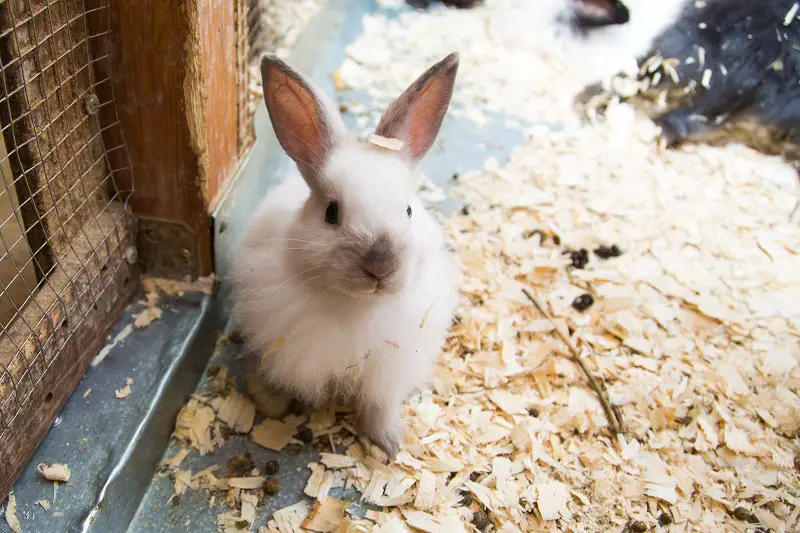
The Real Scoop on Bunny Poop – 5 Bunny Poop Facts
1. Rabbits eat their own poop
Yes, you read that right! Rabbits do eat their own poop, which is called coprophagia. But they do it for a very good reason.
Whilst rabbit poop can be harmful to humans, it’s actually very good for rabbits. Their main source of food is plants which are hard to digest on their own, due to their unique digestive system.
By eating their fecal pellets, it helps to process their food more efficiently and the rabbit gets all the nutrients out of that plant that it needs.
This happens when microorganisms in the bunny’s gut bacteria break down and converts the chemicals found in their food. It allows for better absorption than if they eat their food (e.g., hay, vegetables, or fruit) on their own.
2. Rabbits are big poopers
If you are a new rabbit owner you might notice that your rabbit tends to poop a lot! Don’t be alarmed, rabbits are frequent poopers. They are famous for being able to poop 200 pellets in a day. That means a thousand or more rabbit poop in a week!
A rabbit’s health is very dependent on its gut health. Rabbits need to quickly extract energy from their diet therefore, they need the fast movement of their digestive tract. Rabbits need to be consistently eating for the energy they required and thus also produce quite a lot of fecal matter.
It is also very important to note at this point that because a rabbit’s digestive tract needs to operate at a fast pace that it is also very easy to irritate a rabbit’s digestive system. It is then very important for rabbit owner’s to provide quality hay, leafy greens, and pellets to their pet bunnies.
3. Rabbits have two types of poop
A lot of people are not aware but there are two kinds of fecal matter that a rabbit can produce. The first is called rabbit fecal pellets and the second one is called cecotropes.
Normal rabbit pellets are the fecal matter that rabbits expel more than 100 times each day. They are characterized by their round shape. They are dry, odorless, and mostly made up of undigested hay and fibers. They can also range from light brown to dark in color. The size of your rabbit does not determine how many or how big their rabbit fecal pellets can get.
It is very important to know that a healthy rabbit poo should be friable. This means that their poo has a stable form. If you try to apply gentle pressure to it then it should crumble into something that looks like sawdust. The inside of a healthy rabbit poop should also be made mostly of hay since this is the majority of their diet.
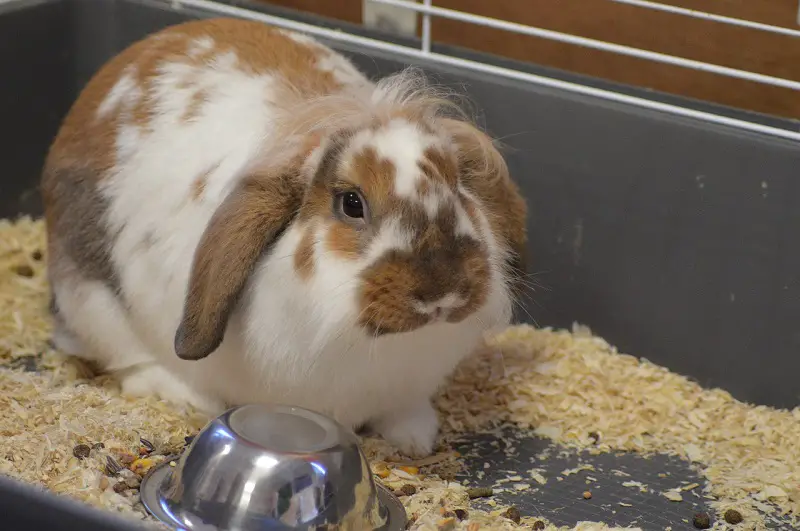
The second type of fecal matter that rabbits expel is called the Cecotropes. Cecotropes are not necessarily called a fecal matter because it’s not considered a waste product. Your rabbits will eat cecotropes as they get nutrients from them. Sounds disgusting? Your rabbit would say it’s a necessary evil.
Cecotropes are flat, round, and dark soft poop that are bundled together. Some say they look like clustered grapes or blackberries. Cecotropes are another product of the fast digestive system of rabbits.
Since their intestines move so fast, they don’t absorb the nutrients during the first time so they have to eat it again for the second pass in their digestive tracts.
Cecotropes are produced in the cecum where the gut has bundled all the nutrients into one package that the rabbits can eat straight from their anus. Cecotropes are smelly and are squishy so they’re not really recommended for squishing.
Although cecotropes are normal, one has to be vigilant about whether their rabbit produces too much of it.
Too many cecotropes mean that the rabbits are eating too many treats loaded with sugar and not enough hay. Cecotropes lying around might also mean that your rabbit is sick and won’t eat them.
4. Rabbit poop as fertilizer
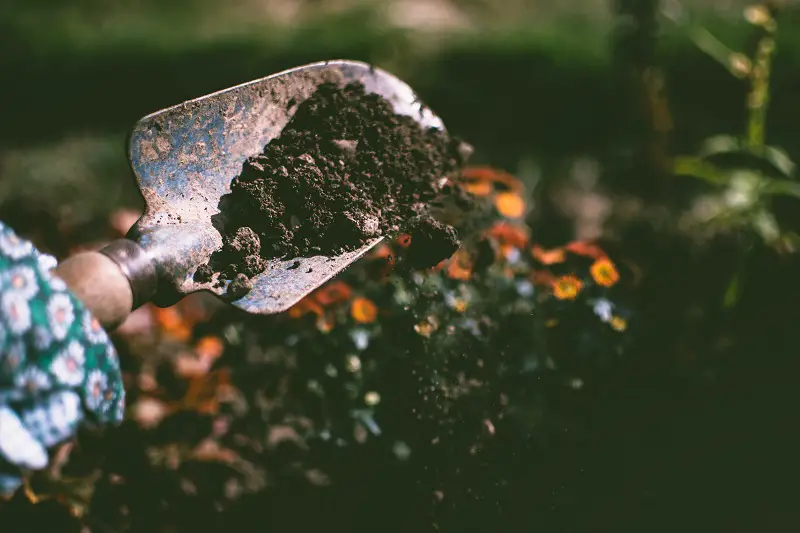
Rabbit poop is frequent and many. Sure it can be a chore to keep their areas clean but rabbit poop is also a perfect tool towards achieving a great garden.
Rabbit poop makes good fertilizers. They are 1% phosphorus, 1% potassium and 2% nitrogen. They are perfect fertilizers to help grow the most beautiful garden in your village.
Some other great rabbit manure facts are the following:
- Rabbit manure doesn’t have to be composted
- Rabbit manure improves soil structure and moisture retention
- Rabbit manure is less messy and less stinky than other animal manure
- Rabbit manure has 4 times more nutrients than cow or horse manure.
- Rabbit manure has 2 times more nutrients than chicken manure
5. Rabbit poop looks like pellets
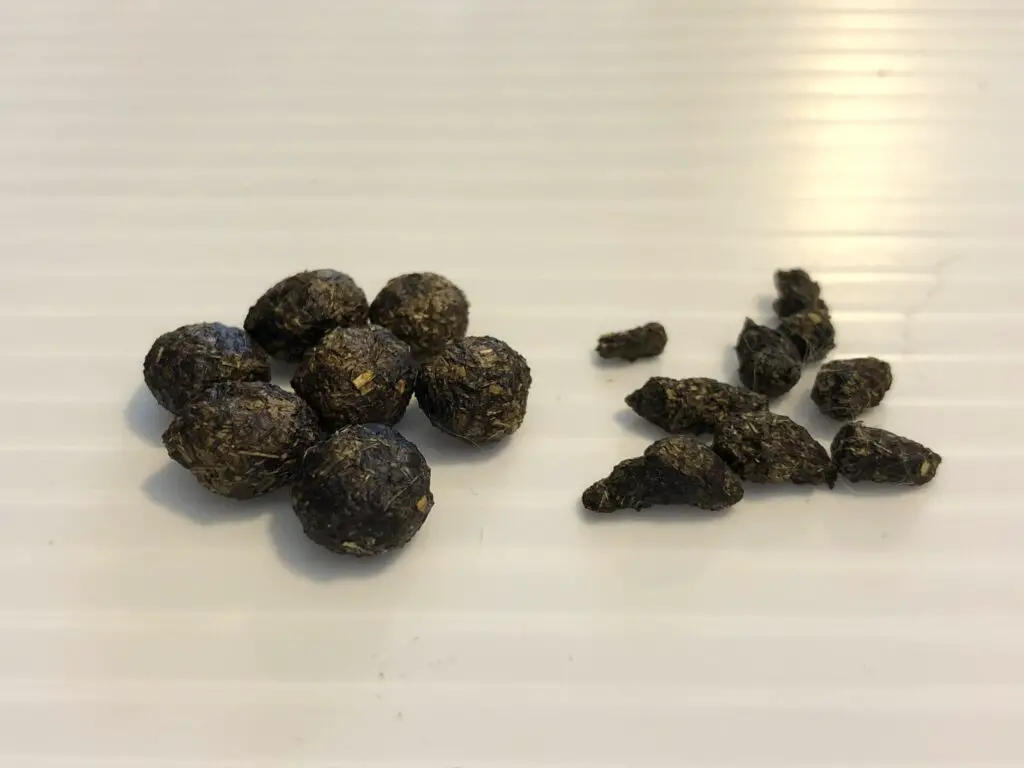
Rabbit poop is small, brown, and looks like an oval-shaped grain of rice.
Do you know what rabbit droppings look like? Rabbits (including wild rabbits) eat plants and hay and produce manure that consists of pellets for animals to consume or graze on.
The intestinal contents combine with the bacteria in the animal’s stomach, then move through the intestinal tract into the anus without being expelled by a bowel movement (like most other mammals).
The shape and color of rabbit poop can vary wildly depending on what they’ve been recently eating
What is abnormal rabbit poop?
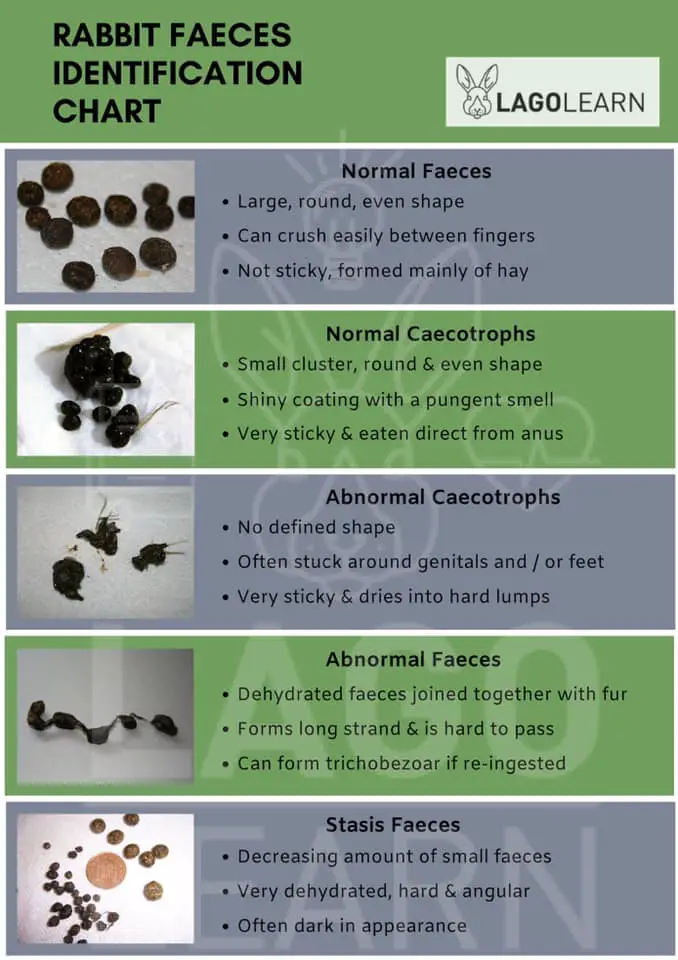
Rabbit poop is a good indication of a rabbit’s health. Therefore it is important to be a vigilant poop spotter. It is important for a pet owner to know what normal poop is and what is not and the reasons behind them.
The following are the different kinds of abnormal rabbit poop:
Misshapen rabbit poop
Rabbit poop is generally circular. If you notice that your pet’s poop takes an irregular shape then this can be a cause of concern. However, there is an easy remedy for this kind of problem.
Misshapen poop is usually caused by a bad diet. Increase your rabbit’s fiber intake and then observe if their fecal matter goes back to normal. You might also have to resist your rabbit’s doe-eyed looks as you have to withhold on their treats and pellets.
Rabbits who are recovering from gastrointestinal stasis and old rabbits who have mobility issues will also have misshapen poop. For recovering rabbits, this should be back to normal once they are fully recovered. For old rabbits, more fiber and less sugar should solve the problem.
Strung together poop
This is usually not a big source of worry. This just means that there is fur in your rabbits’ gut probably ingested while they were grooming themselves. In this case, the rabbit poo will usually be interlinked by fur.
You may avoid this scenario by constantly brushing your rabbit’s fur.
Mucus on rabbit faeces
Mucus on poop will most likely look like a blob of jelly that comes together with the fecal matter. This is usually caused by an irritation in the gut caused by antibiotics. It is also common for rabbits who suffer from dental problems as it slows down their intestinal tracts.
Diarrhea or runny poop
This is pretty obvious. This is a stool that has no shape, takes a liquid form, and can sometimes contain blood. A rabbit who suffers from diarrhea would need immediate vet attention. Rabbits with diarrhea may indicate that the rabbit is infected with bacteria or parasites.
Is it okay for other animals to eat rabbit poop?
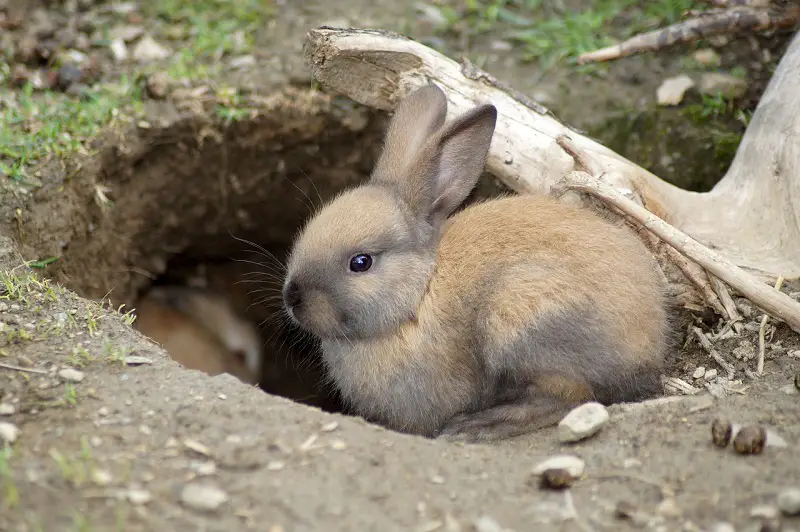
You might be worried that since your rabbit tends to poop a lot your pets such as your ever curious dog might be harmed if they ever do eat rabbit poop. Dogs and other pets rarely get sick when they eat rabbit poop.
Rabbits are herbivores and their fecal matter is mostly just made up of undigested fiber. If your pets eat domestic rabbit poop then it isn’t something to worry about. Be vigilant on hikes though because wild rabbits on the other hand may transmit parasites and diseases.
This also doesn’t mean that you should just let your dog eat all your rabbit’s poop. Never let a dog near a rabbit who has diarrhea, It is always better for your pooch to just strictly eat his kibbles and not enjoy other “treats”.
Can I get sick if I touch my rabbit’s faeces?
Getting sickness out of touching rabbit faeces is very rare. You can pick up their hard pellets but of course, proper sanitation is encouraged. Use gloves when cleaning your rabbit’s hutches and do a thorough cleaning of their litter boxes or pens.
Rabbit litter boxes need to be cleaned every two days. Even though healthy rabbit poop isn’t stinky their urine has huge traces of ammonia and can smell a lot. A clean litter box and hutch mean a stink-free rabbit and a happier pet.
Final Thoughts
For some pet owners dealing with their pet’s fecal wastes is the worst part of the job. However, rabbit owner’s got it lucky because while rabbits tend to frequently excrete poop, they’re also a lot less stinky compared to other animals.
Poop is also very indicative of an animal’s health, so all pet owners should be poop experts.
Laura is an experienced wildlife rehabilitator and conservationist residing in Madison, Wisconsin. Her love for rabbits was sparked during her early career when she nursed an injured wild rabbit back to health. Today, she runs “Hoppy Haven”, a rehabilitation center dedicated to the care and release of injured wild rabbits.
